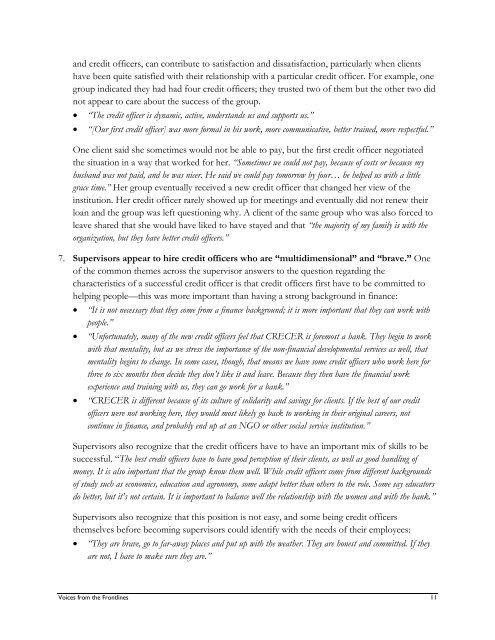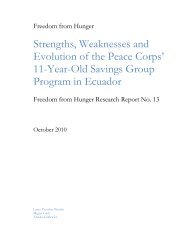Voices from the Frontlines: - Freedom from Hunger
Voices from the Frontlines: - Freedom from Hunger
Voices from the Frontlines: - Freedom from Hunger
You also want an ePaper? Increase the reach of your titles
YUMPU automatically turns print PDFs into web optimized ePapers that Google loves.
and credit officers, can contribute to satisfaction and dissatisfaction, particularly when clients<br />
have been quite satisfied with <strong>the</strong>ir relationship with a particular credit officer. For example, one<br />
group indicated <strong>the</strong>y had had four credit officers; <strong>the</strong>y trusted two of <strong>the</strong>m but <strong>the</strong> o<strong>the</strong>r two did<br />
not appear to care about <strong>the</strong> success of <strong>the</strong> group.<br />
“The credit officer is dynamic, active, understands us and supports us.”<br />
“[Our first credit officer] was more formal in his work, more communicative, better trained, more respectful.”<br />
One client said she sometimes would not be able to pay, but <strong>the</strong> first credit officer negotiated<br />
<strong>the</strong> situation in a way that worked for her. “Sometimes we could not pay, because of costs or because my<br />
husband was not paid, and he was nicer. He said we could pay tomorrow by four… he helped us with a little<br />
grace time.” Her group eventually received a new credit officer that changed her view of <strong>the</strong><br />
institution. Her credit officer rarely showed up for meetings and eventually did not renew <strong>the</strong>ir<br />
loan and <strong>the</strong> group was left questioning why. A client of <strong>the</strong> same group who was also forced to<br />
leave shared that she would have liked to have stayed and that “<strong>the</strong> majority of my family is with <strong>the</strong><br />
organization, but <strong>the</strong>y have better credit officers.”<br />
7. Supervisors appear to hire credit officers who are “multidimensional” and “brave.” One<br />
of <strong>the</strong> common <strong>the</strong>mes across <strong>the</strong> supervisor answers to <strong>the</strong> question regarding <strong>the</strong><br />
characteristics of a successful credit officer is that credit officers first have to be committed to<br />
helping people—this was more important than having a strong background in finance:<br />
“It is not necessary that <strong>the</strong>y come <strong>from</strong> a finance background; it is more important that <strong>the</strong>y can work with<br />
people.”<br />
“Unfortunately, many of <strong>the</strong> new credit officers feel that CRECER is foremost a bank. They begin to work<br />
with that mentality, but as we stress <strong>the</strong> importance of <strong>the</strong> non-financial developmental services as well, that<br />
mentality begins to change. In some cases, though, that means we have some credit officers who work here for<br />
three to six months <strong>the</strong>n decide <strong>the</strong>y don’t like it and leave. Because <strong>the</strong>y <strong>the</strong>n have <strong>the</strong> financial work<br />
experience and training with us, <strong>the</strong>y can go work for a bank.”<br />
“CRECER is different because of its culture of solidarity and savings for clients. If <strong>the</strong> best of our credit<br />
officers were not working here, <strong>the</strong>y would most likely go back to working in <strong>the</strong>ir original careers, not<br />
continue in finance, and probably end up at an NGO or o<strong>the</strong>r social service institution.”<br />
Supervisors also recognize that <strong>the</strong> credit officers have to have an important mix of skills to be<br />
successful. “The best credit officers have to have good perception of <strong>the</strong>ir clients, as well as good handling of<br />
money. It is also important that <strong>the</strong> group know <strong>the</strong>m well. While credit officers come <strong>from</strong> different backgrounds<br />
of study such as economics, education and agronomy, some adapt better than o<strong>the</strong>rs to <strong>the</strong> role. Some say educators<br />
do better, but it’s not certain. It is important to balance well <strong>the</strong> relationship with <strong>the</strong> women and with <strong>the</strong> bank.”<br />
Supervisors also recognize that this position is not easy, and some being credit officers<br />
<strong>the</strong>mselves before becoming supervisors could identify with <strong>the</strong> needs of <strong>the</strong>ir employees:<br />
“They are brave, go to far-away places and put up with <strong>the</strong> wea<strong>the</strong>r. They are honest and committed. If <strong>the</strong>y<br />
are not, I have to make sure <strong>the</strong>y are.”<br />
<strong>Voices</strong> <strong>from</strong> <strong>the</strong> <strong>Frontlines</strong> 11















